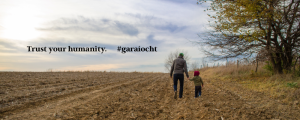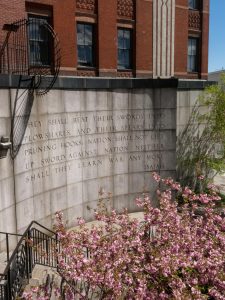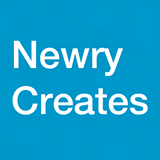The Irish Language
My relationship with the Irish language has evolved over the half dozen years I have been here.
It’s doubtful I’ll learn to speak it, I’ve little facility with language, but what I’ve learned about it has certainly informed my understanding of the people of this island.
Three people opened the door to that understanding.
Carol Conway, Freelance Catalyst, facilitator and youth leadership trainer was the first. I’d no idea that she “had Irish”. She’d studied it for the love of the language.
She held my frustration with the use of it – often politically on the border – as a weapon designed to divide an audience into “them vs us”.
“Eve, you won’t understand the Irish people until you’ve studied the Irish language .”
She got my attention with two relevant aspects of the language:
- The absence of the possessive to have. I don’t have a coat. It’s the coat on me or the coat beside me.
- Tenses are constructed differently. We haven’t had a conversation – the absence of a “past perfect” means we’re “after having a conversation” and after living here, one learns to ask, is anything really in the past?
The net effect informs our use of English – and I’ve heard it posited – makes us the storytellers we are.
Linda Ervine, is a Belfast teacher and an Irish Language evangelist. She sees merit in teaching the “Hidden History of Protestants and the Irish Language” going so far as to suggest that in refusing to become familiar with it we deny the connection of the language to the culture of Ulster.
Beyond opening my eyes to the inclusive nature of the language she opened the door to tolerance. In delivering “The Hidden History of Protestants and the Irish Language” as a talk at the 2012 PUP Conference she even addressed my intolerance of what I once thought was a Northern Irish ignorance of grammar. It’s not! *
This abstract is from the Slugger O’Toole blog on the event.
Linda Ervine spoke about the “hidden history of Protestants and the Irish language”. In what was probably the best delivered session, she explained how she had been filling out the recent census online when she looked back at the 1911 census and discovered that her husband’s relatives had lived in East Belfast and spoke both Irish and English. Yet their signatures were listed on the Ulster Covenant. Linda deduced that their knowledge of Irish wasn’t linked to their politics…
She quoted Douglas Hyde, son of a Church of Ireland minister, first president of Ireland and founder of the Gaelic League in 1893, an organisation set up to preserve the Irish language. In 1905 he said:
The Irish language, thank God, is neither Protestant nor Catholic, it is neither a Unionist nor a Separatist.
Linda went on to illustrate how Irish is behind many place names, and words and phrasing we use in everyday vernacular. She also pointed to the Red Hand Commando’s motto which is in Irish! During the coffee break, several delegates signed up for Irish language classes at East Belfast Mission!
She concluded that language was neutral, only a tool to communicate.
She drove home Carol’s point about the structure of the language and what we have carried over into English. Things she used to correct about her Belfast students’ grammar were actually correct in Irish. This among people who are many generations removed from Irish speakers.
She is “Beating swords into plowshares” in Belfast.
And lastly, a cultural and evolutionary observation which bears out the message of both women:
Anthony McCann has proposed imagining an Irish cultural equivalent to “Ubuntu”
Garaiocht: An Irish Value for an Energised Ireland
 A linguist, musician and a coach he reflects on Garaiocht as a deeply hopeful value which allows an understanding of the possibility of potential and an openness to a deeply hopeful future.
A linguist, musician and a coach he reflects on Garaiocht as a deeply hopeful value which allows an understanding of the possibility of potential and an openness to a deeply hopeful future.
The link will take you to a brief video describing it in greater depth. In short- imagine the folks of this island – at our convivial best, in good company with a pot of tea and the time to express ourselves in stories. This concept of Garaiocht embodies:
1. Nearness
2. Hereness
3. Withness
4. Helpfulness
5. Conviviality
6. Continuous Action (verbal noun – a noun that acts as a verb) Can’t have an absence of action in the notion of Garaiocht
7. Mutual support/interdependence
8. Resourcefulness/Entrepreneurship the ability to make the best use of the resources that you have (opportunities for helpfulness)
9. Response-ability appropriate to context. Leadership quality with its core values at the heart of Irish life This notion of leadership which is not authoritative – not reliant on command and control.
In “sourcing” the wisdom from this ancient language – he reiterates Douglas Hyde’s point, Linda Erivine’s point and Carol Conway’s widsom when she told me:
You won’t understand the Irish people until you’ve studied the Irish language
We can better understand each other with the gift of a language that predates our generations of conflict. A language that is neither Protestant nor Catholic, it is neither a Unionist nor a Separatist.
Thank you Carol, Linda and Anthony – for opening the door to knowing what I might never have otherwise known!
For more on this subject: “Beating Swords into Ploughshares”
* at 16:55 Linda Ervine discusses the structure of the language. To “twig on” begin a bit before that for a fascinating overview of the words that have entered the Northern Irish vernacular directly from the Irish.














